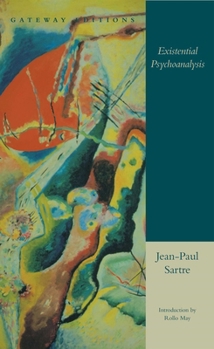Existential Psychoanalysis
Select Format
Select Condition 
Book Overview
In Existential Psychoanalysis , Sartre criticizes modern psychology in general, and Freud's determinism in particular. His often brilliant analysis of these areas and his proposals for their correction indicate in what direction an existential psychoanalysis might be developed. Sartre does all this on the basis of his existential understanding of man, and his unshakeable conviction that the human being simply cannot be understood at all if we see in him only what our study of subhuman forms of life permits us to see, or if we reduce him to naturalistic or mechanical determinism, or in any other way take away from the man we try to study his ultimate freedom and individual responsibility. An incisive introduction by noted existential psychologist Rollo May guides readers through these challenging yet enlightening passages.
Format:Paperback
Language:English
ISBN:0895267020
ISBN13:9780895267023
Release Date:September 1996
Publisher:Gateway Editions
Length:210 Pages
Weight:0.36 lbs.
Dimensions:0.5" x 5.4" x 8.3"
Customer Reviews
2 ratings
Speculative? System-building? Abstract? Gut-wrenching!
Published by Thriftbooks.com User , 20 years ago
This work consists of 2 excerpts from Satre's "Being and Nothingness". What's new is a 17 page introduction by Rollo May. Although May admires Sartre, he does present key differences he has with Sartre, so this intro has some teeth in it. Even as excerpts, there's about 200 pages of meaty exposition that saves you lugging around "Being And Nothingness" if this subset is your focus. Sartre builds up a big, abstract, speculative system, apparently as a framework for his belief in human freedom, choice, and responsibility. What does this construction accomplish that simple assertions wouldn't of our freedom, our not being determined, our defining ourself via our yet-to-be-accomplished projects, our responsibility rooted in our unavoidable need to make choices? Perhaps both emphasis (you'll be less likely to forget you are free), elaboration (you'll learn more what being free as well as trying not to be implies), and examples (you'll learn more of the ways in which people try to avoid the weight of their freedom). Even if the experts tell you they have you all figured out, you'll have decide whether to buy that or not. Even if you want to be all figured out and delivered from uncertainty, they (and you) may be wrong. If Sartre only argued for our individual freedoms, he wouldn't be so important. It is in his exploration of the ways in which we cringe from our freedom, of our "bad faith", that he connects and makes what seems a speculative, abstract system instead a powerful emotional truth.
Excellent Book
Published by Thriftbooks.com User , 26 years ago
I read this book in one sitting and found it to be very informative. In outlining the basis for an existentialist psychoanalysis, Sartre gives interesting and riveting existential perspectives on the human situation. I would recommend anyone with an interest in philosophy, psychology, and the human situation in general to give this book a try.






